List of snack foods

Light snacks in Azerbaijan
.jpg)
Fried snacks in Myanmar
This is a list of snack foods in alphabetical order by type and name. A snack is a small portion of food eaten between meals. This may be a snack food, such as potato chips or baby carrots, but can also simply be a small amount of any food.
Batter and dough-based
See also: List of fried dough foods
Many cultures have dishes that are prepared by cooking batter and deep frying dough in many various forms.
| Name | Image | Origin | Description |
|---|---|---|---|
| Bitterballen |  |
Netherlands | A round shaped beef-ragout version of croquette, typically containing a mixture of beef or veal (minced or chopped), beef broth, butter, flour for thickening, parsley, salt and pepper, resulting in a thick ragout. Most recipes include nutmeg and there are also variations utilizing curry powder or that add in finely chopped vegetables such as carrot. |
| Bonda |  |
South India | Various sweet and spicy versions of exist different regions. The process of making a spicy bonda involves deep-frying potato (or other vegetables) filling dipped in gram flour batter. |
| Cereal [1] |  |
A food made from processed grains that is often eaten cold, usually mixed with milk (e.g. cow's milk, soy milk, rice milk, almond milk), juice, water, or yogurt, sugar, and sometimes fruit, but may be eaten dry. | |
| Cokodok | Malaysia | A traditional Malaysian fritter snack that is made with flour and banana, and is fried. It is usually round in shape and tends to vary in size. | |
| Cracker nuts | A snack food produced with peanuts that are coated in a wheat flour dough and then fried or deep-fried[2] | ||
| Crêpe | 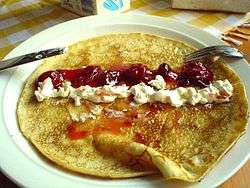 |
Brittany, France | A type of very thin pancake, usually made from wheat flour (crêpes de Froment) or buckwheat flour (galettes). The word is of French origin, deriving from the Latin crispa, meaning "curled". |
| Croquette |  |
France | A French invention with worldwide popularity, a croquette is a small breadcrumbed fried food roll containing, usually as main ingredients, mashed potatoes and/or ground meat (veal, beef, chicken, or turkey), shellfish, fish, cheese, vegetables and mixed with béchamel or brown sauce,[3] and soaked white bread, egg, onion, spices and herbs, wine, milk, beer or any of the combination thereof, sometimes with a filling, e.g. sauteed onions or mushrooms, boiled eggs (Scotch eggs). |
| Doughnut [4] | .jpg) |
A fried dough snack popular in most parts of the world | |
| Gulha | |
A popular snack in Maldives[5] | |
| Khanom buang |  |
Thailand | A snack sold by street vendors in Thailand |
| Pakora | .jpg) |
India | A fried snack (fritter) found across South Asia |
| Pancakes |  |
Flat, soda-leavened semi-sweet cake made with egg and flour. In the United States, pancakes are typically eaten at breakfast with syrup, fruit and yogurt. | |
| Pizza [6] |  |
Disputed. Sources state that Ancient Greece and Italy are likely.[7][8][9] | Flat bread with meat, vegetable and/or cheese toppings. Pizza is often eaten as "mini pizza" or "pizza baguette,[10]" and is often sold by the slice or by weight |
| Poffertjes | .jpg) |
Netherlands | A traditional Dutch batter treat |
| Pretzel, soft |  |
German Italian-American | A traditional baked treat |
| Tele-bhaja (chop) | 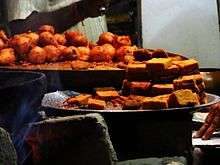 |
Indian subcontinent, specially Bengal region | Bengali fritters; a famous deep-fried snack made with vegetables and besan |
| Waffle |  |
Belgium | A batter-based or dough-based cake cooked in a waffle iron patterned to give a characteristic size, shape and surface impression. There are many variations based on the type of iron and recipe used, with over a dozen regional varieties in Belgium alone.[11] |
Confectionery
See also: List of candies, Category:Candy, and Category:Confectionery
Confectionery is related to food items that are rich in sugar and often referred to as confections. Confectionery refers to the art of creating sugar based dessert forms, or subtleties (subtlety or sotelty), often with pastillage.
| Name | Image | Origin | Description |
|---|---|---|---|
| Brittle |  |
A type of confection consisting of flat broken pieces of hard sugar candy embedded with nuts such as pecans, almonds, or peanuts. Pictured is peanut brittle cracked on a serving dish | |
| Bubblegum |  |
A type of chewing gum, designed to be inflated out of the mouth as a bubble. As with chewing gum, the product is made from chicle and is available in various flavors. | |
| Candy |  |
Also known as "lollies", many diverse candies exist, which include (but is not limited to) candy cane, candy corn, gumdrop, gummi bear, gummi candy, jawbreaker, jelly baby, jelly bean, licorice (also spelled liquorice), lollipop, rock candy and taffy. | |
| Chocolate [6] |  |
Chocolate has been used as a drink for nearly all of its history, and has become one of the most popular food types and flavors in the world. Sweet chocolate such as milk chocolate and dark chocolate are typically eaten as a snack food, as opposed to unsweetened chocolate, which contains primarily cocoa solids and cocoa butter in varying proportions. | |
| Chocolate bar [12] |  |
A confection in bar form comprising some or all of the following components: cocoa solids, cocoa butter, sugar, milk. The relative presence or absence of these components form the subclasses of dark chocolate, milk chocolate, and white chocolate. | |
| Chocolate rugelach |  |
Prepared with a cream cheese dough and a filling consisting of chocolate, jam (or jelly) and cinnamon.[13] The addition of raisins and nuts and raisins is also common.[13] | |
| Chocolate truffle |  |
A type of chocolate confectionery, traditionally made with a chocolate ganache centre coated in chocolate, icing sugar, cocoa powder or chopped toasted nuts (typically hazelnuts, almonds or coconut), usually in a spherical, conical, or curved shape. Other fillings may replace the ganache. | |
| Fudge |  |
Typically sweet and rich, it's prepared by mixing sugar, butter, and milk, heating it to the soft-ball stage at 240 °F (116 °C) and then beating the mixture while it cools so that it acquires a smooth, creamy consistency. Many variations exist with other flavorings added, such as chocolate. | |
| Geplak | |
Made from equal parts coarsely grated coconut and sugar, in equal amounts, often colored brightly. Other variations exist. | |
| Grass jelly |  |
A jelly-like dessert prepared by boiling the aged and slightly oxidized stalks and leaves of Mesona chinensis[14][15] (member of the mint family) with potassium carbonate for several hours with a little starch and then cooling the liquid to a jelly-like consistency.[14][16] | |
| Marshmallow |  |
In its modern form, typically consists of sugar and/or corn syrup, water, and gelatin, whipped to a spongy consistency and coated with corn starch. Marshmallow probably came first into being as a medicinal substance, since the mucilaginous extracts comes from the root of the marshmallow plant, Althaea officinalis, which were used as a remedy for sore throats. Concoctions of other parts of the marshmallow plant had medical purposes as well.[17] | |
| Marzipan |  |
Consisting primarily of sugar or honey and almond meal, sometimes augmented with almond oil or extract. Pictured is marzipan made into the shapes of fruits. | |
| Nougat |  |
A variety of similar traditional confectioneries made with sugar and/or honey, roasted nuts (almonds, walnuts, pistachios, hazelnuts, and recently macadamia nuts are common), whipped egg whites, and sometimes chopped candied fruit. | |
| Panforte | 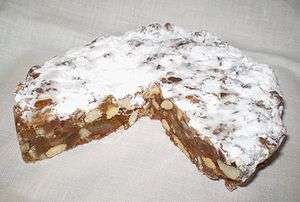 |
A traditional Italian dessert containing fruits and nuts, and resembles fruitcake or Lebkuchen. It may date back to 13th century Siena, in Italy's Tuscany region. Its preparation includes baking a mixture of sugar dissolved in honey, various nuts, fruits and spices and flour. The finished cake is dusted with icing sugar. | |
| Pudding [6] |  |
Most often refers to a dessert, but can also be a savory dish. Depending on its ingredients such a pudding may be served as a part of the main course or as a dessert. | |
| Rice Krispie treats |  |
United States | A sweet dessert or snack made from Rice Krispies, melted butter or margarine, and melted marshmallows.[18] Sometimes marshmallows and/or cereal that is seasonal is used to make these treats holiday-specific. |
| S'mores |  |
A traditional nighttime campfire treat popular in the United States and Canada consisting of a roasted marshmallow and a layer of chocolate sandwiched between two pieces of graham cracker.[19] | |
| Toffee |  |
Made by caramelizing sugar or molasses (creating inverted sugar) along with butter, and occasionally flour. Toffee is sometimes prepared with nuts or raisins. | |
| Turkish delight |  |
A family of confections based on a gel of starch and sugar. Premium varieties consist largely of chopped dates, pistachios and hazelnuts or walnuts bound by the gel; the cheapest are mostly gel, generally flavored with rosewater, mastic, bergamot orange or lemon. |
Cookies, cakes and pastries
See also: List of cookies, Category:Cookies, Category:Cakes, and Category:Pastries
Cookies
| Name | Image | Origin | Description |
|---|---|---|---|
| Arrowroot | |
Arrowroot used to be very popular in British cuisine, and Napoleon supposedly said the reason for the British love of arrowroot was to support the commerce of their colonies.[20] It can be consumed in the form of biscuits, puddings, jellies, cakes, hot sauces, and also with beef tea, milk or veal broth, and noodles in Korean and Vietnamese cuisine. | |
| Chebakia |  |
Morocco [21] | A sesame cookie that is fried and covered with honey.[21] They're typically shaped as a flower.[21] |
| Chocolate chip cookie |  |
A drop cookie that originated in the United States and features chocolate chips as its distinguishing ingredient. | |
| Cookie [22] |  |
In the United States, Canada and Australia a cookie is a small, flat, baked treat, usually containing fat, flour, eggs and sugar. In Scotland, a cookie is a plain bun.[23] In most English-speaking countries outside North America, including the United Kingdom, the most common word for a small, flat, baked treat, usually containing fat, flour, eggs and sugar is biscuit, however in many regions both terms are used, such as the American-inspired Maryland Cookies, while in others the two words have different meanings. Pictured are butter cookies. | |
| Ginger snaps |  |
A globally popular biscuit based snack food, flavored with ginger. | |
| Graham crackers |  |
Invented in Bound Brook, New Jersey by Sylvester Graham | The original graham cracker was made with graham flour, a combination of finely-ground unbleached-wheat flour with the wheat bran and germ coarsely-ground and added back in providing nutrition and flavor. |
| Oatmeal cookie |  |
Cookies prepared with oatmeal. Raisins and other ingredients such as chocolate chips are also sometimes used. | |
| Peanut butter cookie | 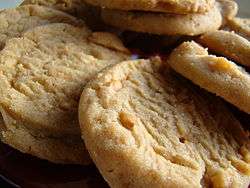 |
United States | A type of cookie that is distinguished by having peanut butter as a principal ingredient. The cookie generally originated in the United States, its development dating back to the 1910s.[24] |
Cakes
See also: List of cakes
| Name | Image | Origin | Description |
|---|---|---|---|
| Gansito | |
Mexico | A Mexican snack cake that is filled with both strawberry jelly and a creamy filling. They are covered in chocolate and have a chocolate sprinkle topping. It was created in 1957 by Marinela (the pastries division of the breadmaking Bimbo brand). |
| Jaffa Cakes | 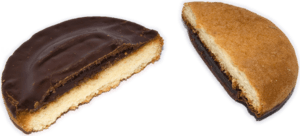 |
Scotland | Introduced by McVitie and Price in 1927 and named after Jaffa oranges, and now manufactured by numerous companies including McVities, Cadbury and other biscuit manufacturers, Tesco and other supermarket chains. |
| Snack cake |  |
A baked dessert confectionery made with cake and icing. |
Pastries
See also: List of pastries
| Name | Image | Origin | Description |
|---|---|---|---|
| Churros | |
Sometimes referred to as a Spanish doughnut, it's a fried-dough pastry, predominantly choux, based snack. Churros are popular in Spain, Italy, France, the Philippines, Portugal, Central America, South America and the United States. Pictured are churros drizzled with chocolate. | |
| Fairy bread | 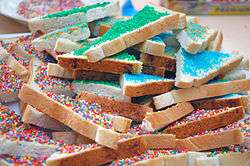 |
||
| Fruit bun |  |
||
| Pastry [4] | .jpg) |
Pictured is a profiterole, also known as a cream puff. | |
| Scones |  |
||
| Snack pie [12] |  |
||
| Toaster pastry [6] | 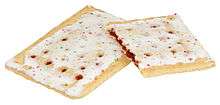 |
||
Drinks
See also: List of beverages and Category:Beverages
| Name | Image | Origin | Description |
|---|---|---|---|
| Amazake |  |
Japan | A traditional sweet, low- or non-alcohol (depending on recipes) Japanese drink made from fermented rice. Amazake dates from the Kofun period, and it is mentioned in the Nihon Shoki, the second oldest book of classical Japanese history. |
| Atole | |
||
| Coffee | |
Ethiopia; southern Arabia | A beverage prepared from the dried seeds (known as coffee beans) of Coffea species. It contains caffeine, a mild stimulant. It is often consumed with sugar and milk mixed in. |
| Colada morada | _(cropped).jpg) |
||
| Energy drinks (Red Bull, Monster) | |||
| Flavored milk | .jpg) |
||
| Horchata |  |
||
| Juice |  |
A beverage prepared from the forced extraction of liquids from fruit and vegetables. | |
| Kefir |  |
||
| Malted milk | |||
| Milkshake |  |
||
| Root beer | |
||
| Root beer float |  |
||
| Sikhye |  |
||
| Soft drinks |  |
||
| Smoothie [25] | |
||
| Sports drinks (Gatorade, Powerade) |  |
||
| Tamagozake | Japan | Consists of heated sake, sugar and a raw egg | |
| Tea |  |
Usually consumed warm. It contains hot water, a teabag for flavour, and sometimes milk and sugar is added. | |
| Tejuino | |
Jalisco, Mexico | A cold beverage made from fermented corn. It is often served with a scoop of shaved ice. |
Frozen
| Name | Image | Origin | Description |
|---|---|---|---|
| Frozen custard |  |
Coney Island, New York | A cold dessert similar to ice cream, but made with eggs in addition to cream and sugar. It was invented in Coney Island, New York in 1919, when ice cream vendors Archie and Elton Kohr found that adding egg yolks to ice cream created a smoother texture and helped the ice cream stay cold longer. In their first weekend on the boardwalk, the Kohr brothers sold 18,460 cones.[26] |
| Ice cream [22] |  |
China | A frozen dessert usually made from dairy products, such as milk and cream, and often combined with fruits or other ingredients and flavours. Most varieties contain sugar, although some are made with other sweeteners. The meaning of the phrase "ice cream" varies from one country to another. Phrases such as "frozen custard", "frozen yogurt", "sorbet", "gelato" and others are used to distinguish different varieties and styles. In some countries, such as the United States, the phrase "ice cream" applies only to a specific variety, and most governments regulate the commercial use of the various terms according to the relative quantities of the main ingredients.[27] In other countries, such as Italy and Argentina, one word is used for all variants. |
| Ice pop |  |
San Francisco | A water-based frozen snack that is made by freezing flavored liquid (such as fruit juice) around a stick. The first recorded ice pop was created in 1905 by 11-year-old Frank Epperson of San Francisco, who left a glass of soda water powder and water outside in his back porch with a wooden mixing stick in it. In the United States and Canada frozen ice on a stick is generically referred to as a popsicle due to the early popularity of the Popsicle brand. In Ireland the product is also referred to as a freeze pop. In the United Kingdom the term ice lolly is used. Ice block is used in parts of Australia[28][29] and New Zealand, as well as icy pole, after a brand of the same name.[30] |
| Milkshake | 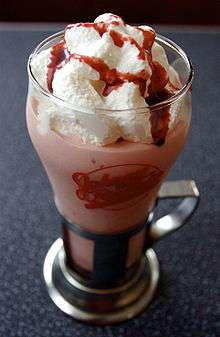 |
A sweet, cold beverage which is usually made from milk, ice cream or iced milk, and flavorings or sweeteners such as fruit syrup or chocolate sauce. Outside the United States, the drink is sometimes called a "thickshake" or a "thick milkshake" or in New England, a "frappe". When the term "milkshake" was first used in print in 1885, milkshakes were an alcoholic whiskey drink that has been described as a "sturdy, healthful eggnog type of drink, with eggs, whiskey, etc., served as a tonic as well as a treat".[31] However, by 1900, the term referred to "wholesome drinks made with chocolate, strawberry, or vanilla syrups." By the "early 1900s people were asking for the new treat, often with ice cream."[31] |
Natural snacks
Sliced cucumbers and tomatoes can be a natural and healthy snack.
Fruits and vegetables
See also: List of culinary fruits and List of vegetables
- Apple [10]
- Banana
- Banana boats – a traditional campfire treat consisting of a banana cut lengthwise and stuffed with marshmallow and chocolate, then wrapped in aluminium foil and cooked in the embers left over from a campfire
- Carrot [10]
- Celery [10]
- Cherries
- Crudités – platters of chopped vegetables usually served with dips
- Dried apple – Czech snack "křížaly"
- Dried fruit [6] – dehydrated
- Fruit roll [10]
- Fruit snacks
- Grapes
- Honeydew
- Kiwi
- Orange [10]
- Peach
- Plums
- Raisins [6]
- Salsa [6]
- Strawberries
- Tostones – also known as tostón, they are made from sliced green (unripe) plantains cut either length-wise or width-wise and are twice fried[32]
- Watermelon
Seeds, nuts, grains and legumes
See also: List of edible seeds and List of culinary nuts
A bowl of granola
Savory snacks
| Name | Image | Origin | Description |
|---|---|---|---|
| Ada | .jpg) |
Kerala | A traditional[35] Keralan delicacy, consisting of rice parcels encased in a dough made of rice flour, with sweet fillings, steamed in banana leaf and served as an evening snack or as part of breakfast. Grated coconut and rice flour are the two main ingredients. |
| Dolma |  |
Balkans, Middle East, Caucases | |
| French fries |  |
||
| Hummus |  |
Pictured is hummus with pine nuts and olive oil. | |
| Instant soup [12] |  |
||
| Khandvi [36] |  |
Gujarat | A collective term used for a type of snacks in Gujarati cuisine, from the Indian state of Gujarat |
| Meze |  |
||
| Nian gao | 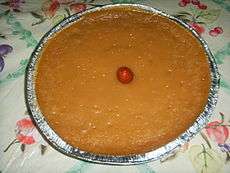 |
||
| Obložené chlebíčky | |
Czech Republic, Slovakia | |
| Onion rings [6] | |
||
| Piattos | |||
| Sesame sticks |  |
||
| Sev mamra | 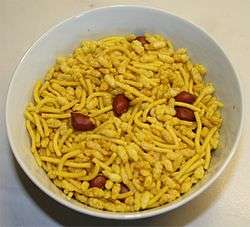 |
India | A mixture of spicy dry ingredients such as puffed rice, savory noodles and peanuts. |
| Spring roll [10] | .jpg) |
||
| Tahini | 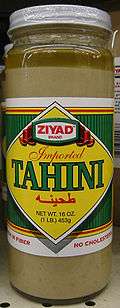 |
||
| Tapas | |
Pictured are tapas in Barcelona, Spain. | |
| Tempura |  |
||
| Yogurt [6] | |
Bars
| Name | Image | Origin | Description |
|---|---|---|---|
| Energy bar [10] | 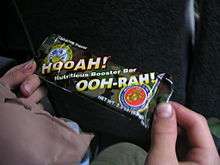 |
Food bars containing cereals and other high energy foods. The first energy bar in the American marketplace was Space Food Sticks which Pillsbury Company created in the late 1960s to capitalize on the popularity of the U.S. space program. | |
| Flapjack |  |
A sweet tray-baked oat bar made from rolled oats, butter, brown sugar and golden syrup. The item is known as a "flapjack" in the United Kingdom and Ireland and as a "cereal bar" in Australia and New Zealand. In other countries such products are referred to as granola bars. | |
| Granola bar [37] |  |
Granola bars were invented by Stanley Mason[38][39] and have become popular as a snack, similar to the traditional flapjack oat bar or muesli bar familiar in the Commonwealth countries. |
Bread/sandwiches
See also: List of breads and List of sandwiches
| Name | Image | Origin | Description |
|---|---|---|---|
| Bagel [6] |  |
Poland | A bread product, traditionally shaped by hand into the form of a ring from yeasted wheat dough, roughly hand-sized, which is first boiled for a short time in water and then baked.[40] |
| Bread [6] | 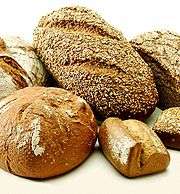 |
Egypt; Europe | |
| Buterbrod |  |
Russia, Ukraine | An open sandwich |
| Butterbrot |  |
Germany | An open sandwich |
| Croissant [10] |  |
||
| Croutons [41] |  |
||
| Fried bake | Caribbean | A type of bread usually eaten with saltfish | |
| Gua-bao |  |
Taiwan | Consists of a slice of stewed meat and other condiments sandwiched between flat steamed bread |
| Houska [41] |  |
Czech Republic | Literally knitted bread |
| Open sandwich [41] |  |
One slice of bread with a topping or toppings | |
| Pasta |  |
Pictured is cavatappi with pesto. | |
| Sandwich [42] | 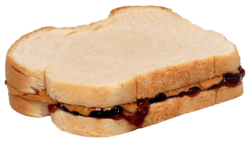 |
A snack typically consisting of two or more slices of bread with one or more fillings between them | |
| Smørrebrød | |
Denmark, Norway | An open sandwich |
| Tea sandwich |  |
United Kingdom | A tea-time snack with the crust removed |
| Tortilla |  |
A flatbread made from corn or wheat | |
| Totopo |  |
Oaxaca | A flatbread made from corn |
Cheese
See also: List of cheeses and Category:Cheese
| Name | Image | Origin | Description |
|---|---|---|---|
| American cheese |  |
United States | A processed cheese from the U.S. American cheese was originally only white, but is now sometimes modified to be yellow-colored. Today it is typically manufactured from a set of ingredients[43] such as milk, whey, milkfat, milk protein concentrate, whey protein concentrate, and salt. |
| Cheese [10] |  |
A generic term for a diverse group of milk-based food products. Pictured is a plate of assorted cheeses. | |
| Cream cheese |  |
||
| Korbáčiky | .jpg) |
Orava region of Slovakia | A type of string cheese |
| Oaxaca cheese |  |
Mexico | A semi-hard string cheese |
| Obatzda |  |
Bavaria | A cheese delicacy |
| Parmesan cheese |  |
||
| Processed cheese |  |
Also called "cheese food"; a food product made from normal cheese and sometimes other unfermented dairy ingredients, plus emulsifiers, extra salt, food colorings, or whey | |
| String cheese | .jpg) |
United States | Snack-sized servings of low-moisture mozzarella |
Chips/crisps
| Name | Image | Origin | Description |
|---|---|---|---|
| Banana chip | 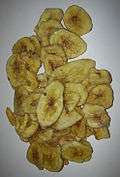 |
Deep-fried and/or dried slices of bananas. They can be covered with sugar or honey and have a sweet taste, or they can be fried in oil and spices and have a salty and/or spicy taste.[44] | |
| Cheese puff | 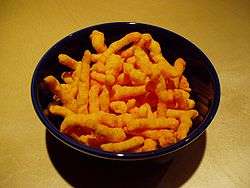 |
A puffed corn snack, coated with a mixture of cheese or cheese-flavored powders[45] | |
| Chifle | |
Peru, Ecuador | A fried plantain snack |
| Corn chips | |
A cornmeal snack that is fried in oil or baked[45] | |
| Corn nuts [6] | |
A snack food made of roasted or deep-fried corn kernels | |
| Fish and shrimp chips[46] | |||
| Multi-grain snacks [47] | Example: Sun Chips | ||
| Nachos | 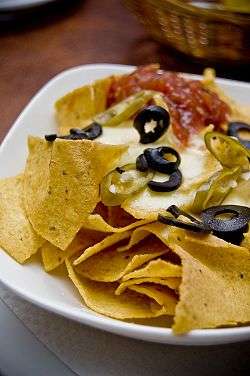 |
Mexico | Fried corn tortillas covered with melted cheddar cheese, pickled jalapeño peppers, and other toppings |
| Pita chips | 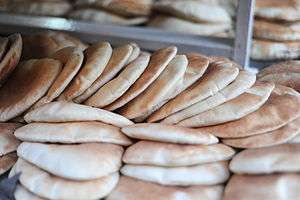 |
||
| Pork rind [48] |  |
||
| Potato chips [45] | 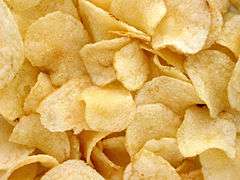 |
||
| Pretzel, hard [49] |  |
||
| Snack mix |  |
Pictured is Chex Mix. | |
| Tortilla chips [45] | |
Mexico | Wedges of fried corn tortillas; originated in Mexico; first produced commercially in Los Angeles, California, United States |
Crackers/biscuits
See also: List of crackers, Category:Crackers (food), and Category:Biscuits (British style)
| Name | Image | Origin | Description |
|---|---|---|---|
| Animal cracker | |
A small cracker or cookie baked in the shape of an animal, usually an animal one might see at a zoo. The most common variety is light-colored and slightly sweet, but darker chocolate-flavored and colorful frosted varieties are also manufactured. | |
| Arare | 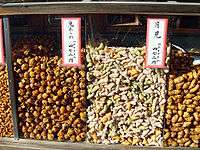 |
Small Japanese rice crackers | |
| Bagel chips |  |
||
| Crackers [50] | 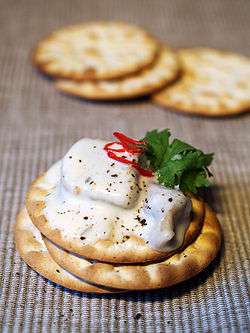 |
Pictured are water biscuits with toppings. | |
| Hardtack |  |
||
| Knäckebröd | |
||
| Lavash | |
||
| Oyster cracker | 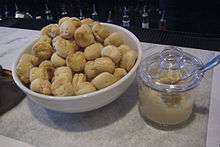 |
||
| Rice cracker [51] | |||
| Senbei [52] |  |
||
| Soda cracker | 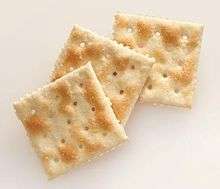 |
||
| Water biscuit |  |
Meat-based
| Name | Image | Origin | Description |
|---|---|---|---|
| Bacon | 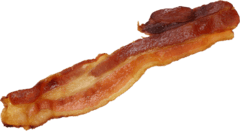 |
A cured meat prepared from a pig, bacon is prepared from several different cuts of meat. | |
| Çiğ köfte | 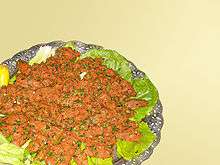 |
||
| Corn dog |  |
||
| Dried cuttlefish | .jpg) |
||
| Dried fish [53] | |
||
| Dried squid [54] | 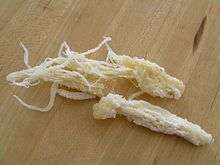 |
||
| Fish such as fried fish [54] | .jpg) |
||
| Hot dogs |  |
||
| Jerky [55] | .jpg) |
||
| Kibbeh nayyeh |  |
||
| Omelet | |
||
| Oysters (canned) [54] |  |
||
| Pickled herring [54] | |
||
| Soused herring |  |
||
Noodles
| Name | Image | Origin | Description |
|---|---|---|---|
| Bombay mix | 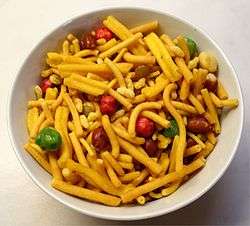 |
Bombay mix is the name used in the United Kingdom and Ireland for a traditional Indian snack known as chiwda, chevdo, bhuso (if made without potato), chevda or chivdo in India, or Chanāchura in Odisha and chanachur in Bengal. It consists of a variable mixture of spicy dried ingredients, which may include fried lentils, peanuts, chickpea flour noodles, corn, vegetable oil, chickpeas, flaked rice, fried onion and curry leaves. | |
| Cup Noodles | 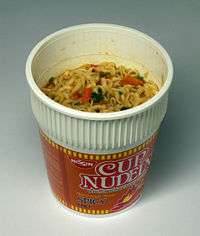 |
A well-known brand of instant ramen noodle snack manufactured by Nissin, packaged in a foam food container, hard plastic or paper cup. Other brand names are used in specific countries, such as Cup Noodle in Japan. | |
| Instant noodles [22] |  |
Invented by Momofuku Ando of Nissin Foods, Japan.[56] | dried or precooked noodles and are often sold with packets of flavoring including seasoning oil. Dried noodles are usually eaten after being cooked or soaked in boiling water, while precooked noodles can be reheated or eaten straight from the packet. |
| Ramen |  |
A Japanese noodle dish that consists of Chinese-style wheat noodles served in a meat- or (occasionally) fish-based broth, often flavored with soy sauce or miso, and uses toppings such as sliced pork, chāshū, dried seaweed, nori, kamaboko, green onions, and occasionally corn. |
See also
References
- ↑ Lusas (et al.) 2001, p. 3.
- ↑ Sietsema, Robert (January 27, 2009). "Strange Snacks of the World -- Cracker Nuts". Village Voice. Retrieved September 1, 2016.
- ↑ James Beard Foundation
- 1 2 Booth 1990, p. 31.
- ↑ Xavier Romero-Frias, The Maldive Islanders, A Study of the Popular Culture of an Ancient Ocean Kingdom, Barcelona 1999, ISBN 84-7254-801-5
- 1 2 3 4 5 6 7 8 9 10 11 12 13 14 15 Lusas (et al.) 2001, p. 6.
- ↑ The Oxford Companion to Italian Food - Gillian Riley - Google Books
- ↑ Passionate about Pizza - Diana Coutu - Google Books
- ↑ Kitchen as Laboratory: Reflections on the Science of Food and Cooking - Google Books
- 1 2 3 4 5 6 7 8 9 10 11 Reineccius 2005. p. 405
- ↑ "Les Gaufres Belges"
- 1 2 3 4 Tull 2012, pp. 40-41.
- 1 2 https://books.google.com/books?id=52m-6VXf6xgC&pg=PA36&dq=Chocolate+Rugelach&hl=en&sa=X&ei=XjpfUfOdIeOVjAKZuoGIDA&ved=0CEUQ6AEwAg#v=onepage&q=Chocolate%20Rugelach&f=false
- 1 2 "仙草". 台北市內雙溪森林藥用植物園編輯組. "本品加水與少許鹹共同煎汁,添加少許澱粉漿可製成仙草凍,是夏天常吃的清涼飲品"
- ↑ Armstrong, Wayne P., Grass Jelly (Mesona chinensis), retrieved 2008-05-19
- ↑ Bush, Austin, Inside the greenhouse, retrieved 2008-05-19
- ↑ Rohde, Eleanour Sinclair; A Garden of Herbs, Hale Cushman & Flint, 1936
- ↑ http://www.ricekrispies.com/recipes/the-original-treats.aspx
- ↑ "S'more - Definition". Merriam-Webster. Retrieved 2013-02-19.
- ↑ "Thick and thin". New Statesman. 2001-10-29. Retrieved 2010-09-12.
- 1 2 3 https://books.google.com/books?id=Ae_Sou_-JiYC&pg=PA94&dq=Chebakia&hl=en&sa=X&ei=sz5fUfrIO8m3iwKgwYH4DA&ved=0CDEQ6AEwAA#v=onepage&q=Chebakia&f=false
- 1 2 3 Croll 2006, p. 177.
- ↑ cookie - Britannica Online Encyclopedia
- ↑ Peanut Butter Cookies(www.NewEnglandRecipes.org)
- ↑ Hu 2008, p. 421.
- ↑ Robert Sietsema (June 14, 2005). "Happy Days". The Village Voice.
- ↑ "Ice Cream Labeling: What Does it all Mean?". International Foodservice Distributors Association. Archived from the original on May 14, 2008. Retrieved 2008-08-09.
- ↑ "Ice block". Encarta Dictionary. MSN Encarta. Archived from the original on 2009-10-31. Retrieved 2008-12-30.
- ↑ "Skybomber 1.63 Litre 24 Pack Ice Blocks". Products. Dairy Bell Ice Cream. Retrieved 2008-12-30.
- ↑ "Nestlé Peters Icy Pole". Ice Cream Products. Nestlé Australia. Retrieved 2010-10-08.
- 1 2 Listening to America, Stuart Berg Flexner [Simon & Schuster:New York] 1982 (p. 178)
- ↑ Cuban Tostones recipe
- ↑ Burtea 2001, p. 287.
- ↑ Lusas (et al.) 2001, p. 447, 453, 458.
- ↑ "'Nadan' food fiesta". The Hindu. 2008-05-03.
- ↑ Lusas (et al.) 2001, p. 479.
- ↑ Lusas (et al.) 2001, p. 134.
- ↑ Stanley Mason, 84, Prolific Inventor - January 19, 2006 - The New York Sun
- ↑ Inventor of the Week: Archive
- ↑ Encyclopædia Britannica (2009) Bagel, retrieved February 24, 2009 from Encyclopædia Britannica Online
- 1 2 3 Booth 1990, p 30.
- ↑ Booth 1990, p. 25.
- ↑ Kraft Singles (Orange) Ingredients List.
- ↑ Food processing, EPa. "How to Make Sweet and Salted Banana Chips". Retrieved 16 May 2012.
- 1 2 3 4 Lusas (et al.) 2001, p. 481.
- ↑ Lusas (et al.) 2001, p 432.
- ↑ Lusas (et al.) 2001, p. 214.
- ↑ Lusas (et al.) 2001, p. 5.
- ↑ Lusas (et al.) 2001, p 371.
- ↑ Lusas (et al.) 2001, p. 523.
- ↑ Lusas (et al.) 2001, p. 120.
- ↑ Lusas (et al.) 2001, p. 458.
- ↑ Lusas (et al.) 2001, p. 421, 435.
- 1 2 3 4 Lusas (et al.) 2001, p. 435.
- ↑ Lusas (et al.) 2001, pp. 425-426.
- ↑ "Inventor of instant noodles dies" BBC News. 6 January 2007
Bibliography
- Booth, R. Gordon (editor) (1990). Snack Food. Springer. ISBN 0442237456
- Burtea, O (2001). "Snack Foods from Formers and High-Shear Extruders". In Lusas EW; Rooney LW. Snack Foods Processing. p. 287. ISBN 1-56676-932-9.
- Croll, Elisabeth (2006). China's New Consumers: Social Development and Domestic Demand. Routledge. ISBN 0203967054
- Hu, Frank (2008). Obesity Epidemiology. Oxford University Press. ISBN 0199718474
- Lusas, Edmund W. Lusas; Rooney, Lloyd W. (editors) (2001). Snack Foods Processing CRC Press. ISBN 1420012541
- Reineccius, Gary (2005). Flavor Chemistry and Technology, Second Edition. CRC Press. p 405. ISBN 0203485343
- Tull, Anita (2012). Food Technology: An Introduction. Oxford University Press. Pages 40–41. ISBN 0198328192
This article is issued from Wikipedia - version of the 11/17/2016. The text is available under the Creative Commons Attribution/Share Alike but additional terms may apply for the media files.